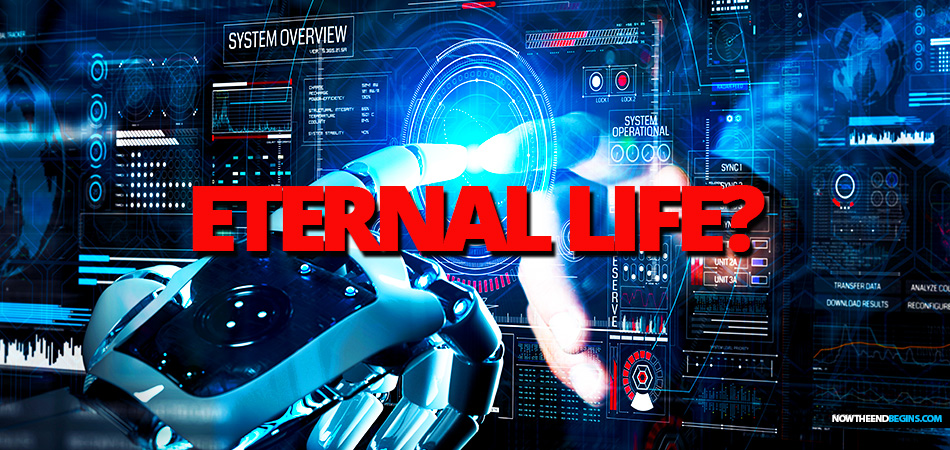
Covid-19 has spotlighted the promise and peril of transhumanism, the idea of using AI technology to overcome sickness, aging and death and achieve eternal life.
Ever since the Tower of Babel, fallen man has dreamed, schemed and plotted a way that they could have eternal life apart from the One who created them, that is God. They don't want to die, no one does, but neither do they care about or wish to be accountable to a holy and righteous God who has every right to demand that from His own creation. Transhumanism is the idea that with enough advances in technology, unregenerate man will eventually figure out how to be immortal. But that will never happen.
"Forasmuch then as the children are partakers of flesh and blood, he also himself likewise took part of the same; that through death he might destroy him that had the power of death, that is, the devil; And deliver them who through fear of death were all their lifetime subject to bondage." Hebrews 2:14,15 (KJB)
It will never happen, because in order to do that through transhumanism, man has to somehow be able to leverage the intellect God gave him, in the body God gave him, while breathing God's air, while feeling his heart that continues to beat in his chest only because God allows it to, and create an eternity that God is not allowed to be a part of. Did you know that the bible has a name for a place where that will happen? It's called Hell. Don't go. Transhumanism offers the illusion of eternal life while blinding you to the truth of the word of God.

A SHORT 5 MINUTE VIDEO PRESENTING THE REAL TRUTH ABOUT HEAVEN AND HELL
Looking Forward To the End of Humanity With Transhumanism
FROM THE WALL STREET JOURNAL: It sounds bitterly ironic now, in the midst of a global pandemic, but not long ago some of the most forward-looking people in the world believed that humanity was close to abolishing death. “If you ask me today, is it possible to live to be 500? The answer is yes,” said Bill Maris, the founder of Google Ventures, in 2015. Three years later, biomedical researcher Aubrey de Grey estimated that “people in middle age now have a fair chance” of never dying.
Eternal life through advanced technology seems like a pipe dream for a society that, until recently, had trouble manufacturing enough masks to save doctors’ and nurses’ lives. Yet Covid-19 may turn out to be just the kind of crisis needed to turbocharge efforts to create what its advocates call a “transhuman” future. With our biological fragility more obvious than ever, many people will be ready to embrace the message of the Transhumanist Declaration, an eight-point program first issued in 1998: “We envision the possibility of broadening human potential by overcoming aging, cognitive shortcomings, involuntary suffering and our confinement to planet Earth.”
Transhumanists, many of them associated with nonprofits and think tanks like Humanity Plus and the Extropy Institute, have long been driven by the fear that our entire species could be wiped out by nuclear war, asteroid collision, technological accident—or a pandemic. In March, as the coronavirus was spreading around the world, the science writer Tom Chivers observed that it proves the need for technological protection against such existential threats: “Humans could be around for a billion years, or more, if we don’t screw it up. Coronavirus won’t be the thing that kills us all, but it’s a bloody good illustration of how something could,” he wrote in the online magazine UnHerd.
People have always feared death and dreamed of escaping it.
But until now, that hope has been formulated in religious terms. Transhumanism promises that death can be conquered physically, not just spiritually; and the movement has the support of people with the financial resources to make it happen, if anyone can. Jeff Bezos, Peter Thiel and Elon Musk are among the Silicon Valley moguls who have invested in life-extension research. In 2013, Google entered the field by launching the biotech firm Calico, short for California Life Company.
Transhumanists envision several possible avenues to immortality. Nanorobots could live inside our cells and constantly repair damage, halting aging in its tracks. Genetic engineering could eliminate the mechanisms that cause us to age in the first place. Such technologies are still out of reach, but transhumanists believe we will be able to master them sooner than most people think, with the help of superpowered artificial intelligence.
Ultimately, however, the hope is that we won’t just use computers—we’ll become them. Today, cognitive scientists often compare the brain to hardware and the mind to the software that runs on it. But a software program is just information, and in principle there’s no reason why the information of consciousness has to be encoded in neurons.
This may sound like science fiction, but it’s also the natural conclusion of the technological advances of the last 20 years. The internet has already made it largely unnecessary to physically visit places like banks, post offices and movie theaters, and the lockdown has given a big push to this trend. As our physical worlds shrink in an effort to avoid contracting Covid-19, our virtual worlds are expanding to make up for it. For the foreseeable future, many of us will be attending virtual schools, worshiping at virtual churches and socializing at virtual parties. And the history of the internet suggests that once things move online, they seldom move back—just ask department stores and CD manufacturers.
The pandemic is also exposing one of the biggest challenges that will emerge along with the transhuman future: new kinds of social inequality that will make the existing ones seem minor. During the months of lockdown, a sharp division emerged between people who work with information—images, words, numbers—and people who work with objects—shelving groceries, delivering packages, nursing the sick. The former can shelter in place and communicate through screens, but the latter have to venture out into the physical world, putting themselves at risk of infection.
As technology makes it possible to escape more of the burdens and dangers of physical existence, this class and professional divide could deepen into an existential one, with a virtual elite being served by an embodied working class. Of course, wealth and power have always offered some insurance against life’s risks. During the Civil War, Americans could pay a substitute to take their place in the draft; soon, you may be able to pay someone to take your place in the disease- and danger-ridden physical world, while you stay behind the safety of a screen.
A transhuman future in which mortality is optional may sound like paradise, but if it arrives sooner for some of us than for others, it could prove to be a dystopia. READ MORE
We are already cyborgs | Elon Musk | Code Conference 2016
This is the future that lost people dream of, eternal life without God. That's Hell.
No comments:
Post a Comment